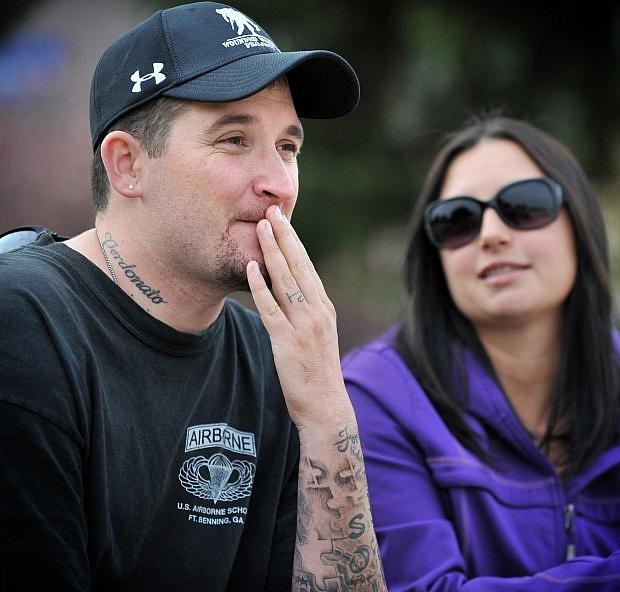Veteran: 'You're taught in the military that you don't ask for help'
Billings Gazette health reporter Cindy Uken is a 2012 National Health Journalism Fellow. This article is part of a series examining the suicide epidemic in Montana. Other stories in this series include:
Suicide survivor: 'There was really no help for me and no hope'
Teenage girl fatally shoots herself days before '08 school year begins
Before a suicide, a mother's lament: 'Why can't I fix this?'
Miles City school administrators tackle problem of suicide
Play designed to help youth feel comfortable discussing suicide, feelings of despair
Suicide is 2nd leading cause of death among Montana youth
Veterans twice as likely to commit suicide as civilians
Police officer: 'Ma'am, I found your husband'
Veteran: 'I just always hoped that I would be in that freak car accident'
Suicide rate among Montana's senior citizens outpaces national figure

HELENA — Seven of the men who deployed to Iraq with Ryan Ranalli have committed suicide. The latest killed himself in August.
Ranalli, a retired U.S. Army sergeant, saw how the deaths gutted family members.
Despite struggling with the demons of post-traumatic stress disorder and traumatic brain injury, Ranalli, 33, vowed that suicide would never be an option.
Yet about 9 p.m. on April 8, an angry and drunken Ranalli mumbled something to his wife, “I love you,” or “You know I will always love you” and sought refuge in the family’s garage.
There, the 200-pound, 6-foot, 3-inch veteran grabbed a parachute cord, wrapped it around his neck and slung it over a beam.
His horrified wife, Jamie, placed a frantic call to his parents who live two minutes away and then went to the garage to be with her husband of two years.
“I thought if I was standing there he wasn’t going to do anything,” Jamie said, choking back tears.
Ranalli’s father cut the cord to rescue his son.
He was transported immediately to the VA hospital.
The drunken episode was the first in about two years.
“I didn’t ever expect that to happen,” Jamie said. “That’s never been him. In my heart I don’t believe it was a serious attempt. I believe it was a cry for help. I believe he was just so overloaded with the feelings and the emotions. Of course, the drinking didn’t help any of that. I believe he was screaming to get him somewhere where he could unload all of this.”
Ranalli remembers nothing of that night, but recalls with precision the events that led to his alcohol-fueled decision.
He was a squad leader with the 502nd Infantry Brigade in March 2003 when it headed the 101st Airborne’s combat air assault into Iraq. The ninth anniversary of the invasion triggered memories of dates when comrades were killed and of defining firefights and battles. He recalled vivid images of combat, images he had suppressed and never discussed.
“From the time we crossed into Iraq, it was constant firefights,” Ranalli said. “I was in a firefight in Karbala for, I think, 33 hours. So, a lot of carnage. Saw a lot of death on both sides of the war, both Iraqis and Americans. A lot of violent, bloody death.”
He was there for the Battle of Najaf, a major battle in the 2003 invasion of Iraq. He also participated in the Battle of Baghdad in April 2003, as part of the invasion of Iraq. He was there for other battles, too.
He was the victim of multiple roadside bombs and rocket-propelled grenade blasts. All were taking a toll. His short-term memory was impaired. He suffered from seizures, depression, anger and anxiety.
But as a member of the military, he suffered silently.
“You’re taught in the military that you don’t ask for help,” Ranalli said. “If you do, it’s a sign of weakness, especially in the infantry, to talk to somebody or to ask for help. You’re looked down upon. It’s just kind of beat into you. You’re supposed to be self-sufficient.”
Ranalli medically retired in 2008 and was diagnosed with PTSD later that same year.
"I thought everything was normal," Ranalli said. "But I started to realize that you're not supposed to go around punching people, getting in fights or staying in bed for days at a time.”
He still suffers from seizures, anger, depression and anxiety. He takes anti-depressant, anti-seizure and anti-anxiety medications.
He is employed as a custodian at VA Montana at Fort Harrison and is the veterans’ representative on the board of directors for the National Alliance on Mental Illness -- Montana.
He has begun for the first time to share publicly his personal challenges as he lobbies for a Vet Center in Helena. Vet Centers are designed to help returning veterans with readjustment counseling.
Retired Maj. Gen. Gene Prendergast of Helena has watched the reserved Ranalli “spill his guts” in his fight for the Vet Center.
“He is my hero,” Prendergast said. “Here he is going through his own issues and he’s so concerned about his fellow veterans who need help. There is not a higher calling than that. He is a man of courage.”
Ranalli and his wife have four children ages 3, 5, 7 and 9.
Ranalli has been sober since April 9.
He said he has at least five reasons that he won’t make another suicide attempt.
“My family.”
This article was first published December 30, 2012 by the Billings Gazette
Photo Credit: James Woodcock

